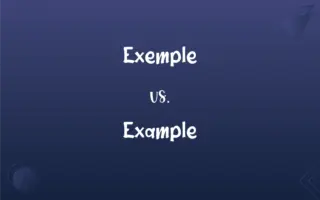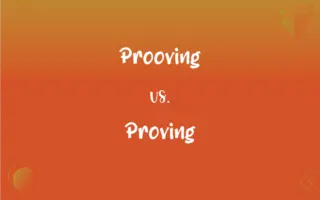Abondon vs. Abandon: Mastering the Correct Spelling
Edited by Aimie Carlson || By Janet White || Updated on March 10, 2024
"Abondon" is an incorrect spelling. "Abandon" is the correct spelling, signifying to leave or give up completely.

Which is correct: Abondon or Abandon
How to spell Abandon?

Abondon is Incorrect

Abandon is Correct
ADVERTISEMENT
Key Differences
Remember "Abandon" has just one 'o' in the middle.
Practice writing "Abandon" frequently to reinforce memory.
Think of the phrase “band” in "Abandon" to recall the correct letters.
Associate "Abandon" with "bandit" who often leaves or abandons.
Envision someone "abandoning" a "band" to ensure correct placement of 'a' and 'o'.
ADVERTISEMENT
Correct usage of Abandon
The ship was abondon in the middle of the ocean.
The ship was abandon in the middle of the ocean.
They had to abondon their home due to the storm.
They had to abandon their home due to the storm.
The city is full of buildings that have been abondon.
The city is full of buildings that have been abandon.
The project was abondon after several years of work.
The project was abandon after several years of work.
He decided to abondon his studies and travel instead.
He decided to abandon his studies and travel instead.
Abandon Definitions
Abandon can mean to desert someone in need.
He abandoned his family.
To withdraw one's support or help from, especially in spite of duty, allegiance, or responsibility; desert
Abandon a friend in trouble.
To give up by leaving or ceasing to operate or inhabit, especially as a result of danger or other impending threat
Abandoned the ship.
To surrender one's claim to, right to, or interest in; give up entirely
Abandon a belief.
To cease trying to continue; desist from
Abandoned the search for the missing hiker.
To yield (oneself) completely, as to emotion.
Great enthusiasm or lack of restraint
Skied with abandon.
(transitive) To give up or relinquish control of, to surrender or to give oneself over, or to yield to one's emotions.
(transitive) To desist in doing, practicing, following, holding, or adhering to; to turn away from; to permit to lapse; to renounce; to discontinue.
(transitive) To leave behind; to desert, as in a ship, a position, or a person, typically in response to overwhelming odds or impending dangers; to forsake, in spite of a duty or responsibility.
Many baby girls have been abandoned on the streets of Beijing.
She abandoned her husband for a new man.
To subdue; to take control of.
To cast out; to banish; to expel; to reject.
(transitive) To no longer exercise a right, title, or interest, especially with no interest of reclaiming it again; to yield; to relinquish.
I hereby abandon my position as manager.
(transitive) To surrender to the insurer (an insured item), so as to claim a total loss.
A yielding to natural impulses or inhibitions; freedom from artificial constraint, with loss of appreciation of consequences.
(obsolete) abandonment; relinquishment.
To cast or drive out; to banish; to expel; to reject.
That he might . . . abandon them from him.
Being all this time abandoned from your bed.
To give up absolutely; to forsake entirely ; to renounce utterly; to relinquish all connection with or concern on; to desert, as a person to whom one owes allegiance or fidelity; to quit; to surrender.
Hope was overthrown, yet could not be abandoned.
Reflexively: To give (one's self) up without attempt at self-control; to yield (one's self) unrestrainedly; - often in a bad sense.
He abandoned himself . . . to his favorite vice.
To relinquish all claim to; - used when an insured person gives up to underwriters all claim to the property covered by a policy, which may remain after loss or damage by a peril insured against.
Abandonment; relinquishment.
A complete giving up to natural impulses; freedom from artificial constraint; careless freedom or ease.
The trait of lacking restraint or control; freedom from inhibition or worry;
She danced with abandon
A feeling of extreme emotional intensity;
The wildness of his anger
Forsake, leave behind;
We abandoned the old car in the empty parking lot
Stop maintaining or insisting on; of ideas, claims, etc.;
He abandoned the thought of asking for her hand in marriage
Both sides have to give up some calims in these negociations
Give up with the intent of never claiming again;
Abandon your life to God
She gave up her children to her ex-husband when she moved to Tahiti
We gave the drowning victim up for dead
Leave behind empty; move out of;
You must vacate your office by tonight
Leave someone who needs or counts on you; leave in the lurch;
The mother deserted her children
Abandon means to leave behind or give up.
He decided to abandon his post.
Abandon can refer to quitting a course of action.
They had to abandon their plans due to bad weather.
Abandon is to relinquish control or influence.
The town was abandoned to its fate.
Abandon implies leaving a place or situation often without intent to return.
The ship was abandoned at sea.
Abandon Sentences
The explorers had to abandon their camp due to the approaching storm.
The team decided to abandon the plan when they realized it was unworkable.
He chose to abandon his car in the traffic jam and walk the rest of the way.
The company will abandon the old software for a new system.
Artists sometimes feel like they have to abandon their principles to succeed.
Parents should never abandon their children.
The policy was abandon after widespread criticism.
Due to health concerns, she had to abandon her dream of becoming an athlete.
They had no choice but to abandon the sinking ship.
After the fire, the building was left to abandon.
The island was abandon by its inhabitants years ago.
The miner had to abandon the mine after it was deemed unsafe.
Soldiers must never abandon their posts.
The mission was abandon when the risk became too great.
It's important not to abandon your beliefs under pressure.
Moving to a new country often means having to abandon old habits.
To abandon hope is to give up completely.
The garden was abandon and overgrown with weeds.
They were forced to abandon their attempts to climb the mountain.
The scientist had to abandon his experiment halfway through.
She decided to abandon her pursuit of a medical degree.
Abandoning pets is both cruel and illegal.
The town was quickly abandon after the factory closed.
To abandon one's responsibilities can lead to serious consequences.
Abandon Idioms & Phrases
Abandon ship
To leave a ship because it is sinking; to leave any situation in which disaster seems imminent.
When it was clear that the water was flooding in too fast, the captain gave the order to abandon ship.
With reckless abandon
To do something very freely and without considering the consequences.
They danced with reckless abandon, completely lost in the music.
Abandon all hope
To completely give up hope or despair.
The phrase Abandon all hope, ye who enter here is famously inscribed at the entrance to Hell in Dante's Inferno.
Abandon oneself to
To give oneself over completely to a feeling or activity.
She abandoned herself to grief after hearing the tragic news.
FAQs
What is the verb form of Abandon?
The verb form is "Abandon."
What is the pronunciation of Abandon?
It's pronounced ə-BAN-dən.
Which vowel is used before Abandon?
"A" as in "an" can be used before "Abandon."
What is the root word of Abandon?
The root is from the Old French "abandoner."
Which conjunction is used with Abandon?
No specific conjunction is directly linked to "Abandon."
Which article is used with Abandon?
"An" as in "an abandon of caution."
What is the singular form of Abandon?
"Abandon" itself is both the singular form and the base verb form.
Is Abandon an adverb?
No, "Abandon" is not an adverb.
Why is it called Abandon?
"Abandon" is derived from Old French "abandoner," meaning to surrender or relinquish.
Is Abandon an abstract noun?
When used as a noun, it can be abstract, signifying a complete surrender.
Is Abandon a negative or positive word?
"Abandon" is typically seen as negative, indicating desertion or relinquishment.
Is Abandon a noun or adjective?
"Abandon" can be both a verb and a noun.
Is Abandon a vowel or consonant?
"Abandon" is a word composed of both vowels and consonants.
Is Abandon a countable noun?
Not in its noun form; it's used as a general state or condition.
Is the word Abandon imperative?
It can be, as in "Abandon the ship!"
How many syllables are in Abandon?
There are three syllables.
How do we divide Abandon into syllables?
A-ban-don.
What is the opposite of Abandon?
The opposite is "retain" or "stay."
What is the plural form of Abandon?
Verbs don’t have plural forms; "Abandon" remains the same.
Which preposition is used with Abandon?
"Of" or "to" as in "abandon of hope" or "abandon to despair."
Is Abandon a collective noun?
No, "Abandon" is not a collective noun.
Is the Abandon term a metaphor?
Not inherently, but can be used metaphorically in contexts like "abandon of restraint."
What is a stressed syllable in Abandon?
The second syllable, "ban," is stressed.
How is Abandon used in a sentence?
The explorers had to abandon their camp due to a storm.
What part of speech is Abandon?
"Abandon" is primarily a verb but can also be a noun.
What is another term for Abandon?
Another term could be "forsake."
Which determiner is used with Abandon?
"Complete" as in "complete abandon."
What is the first form of Abandon?
The first form is "Abandon."
What is the second form of Abandon?
The second form is "Abandoned."
What is the third form of Abandon?
The third form is "Abandoned."
About Author
Written by
Janet WhiteJanet White has been an esteemed writer and blogger for Difference Wiki. Holding a Master's degree in Science and Medical Journalism from the prestigious Boston University, she has consistently demonstrated her expertise and passion for her field. When she's not immersed in her work, Janet relishes her time exercising, delving into a good book, and cherishing moments with friends and family.
Edited by
Aimie CarlsonAimie Carlson, holding a master's degree in English literature, is a fervent English language enthusiast. She lends her writing talents to Difference Wiki, a prominent website that specializes in comparisons, offering readers insightful analyses that both captivate and inform.


































































